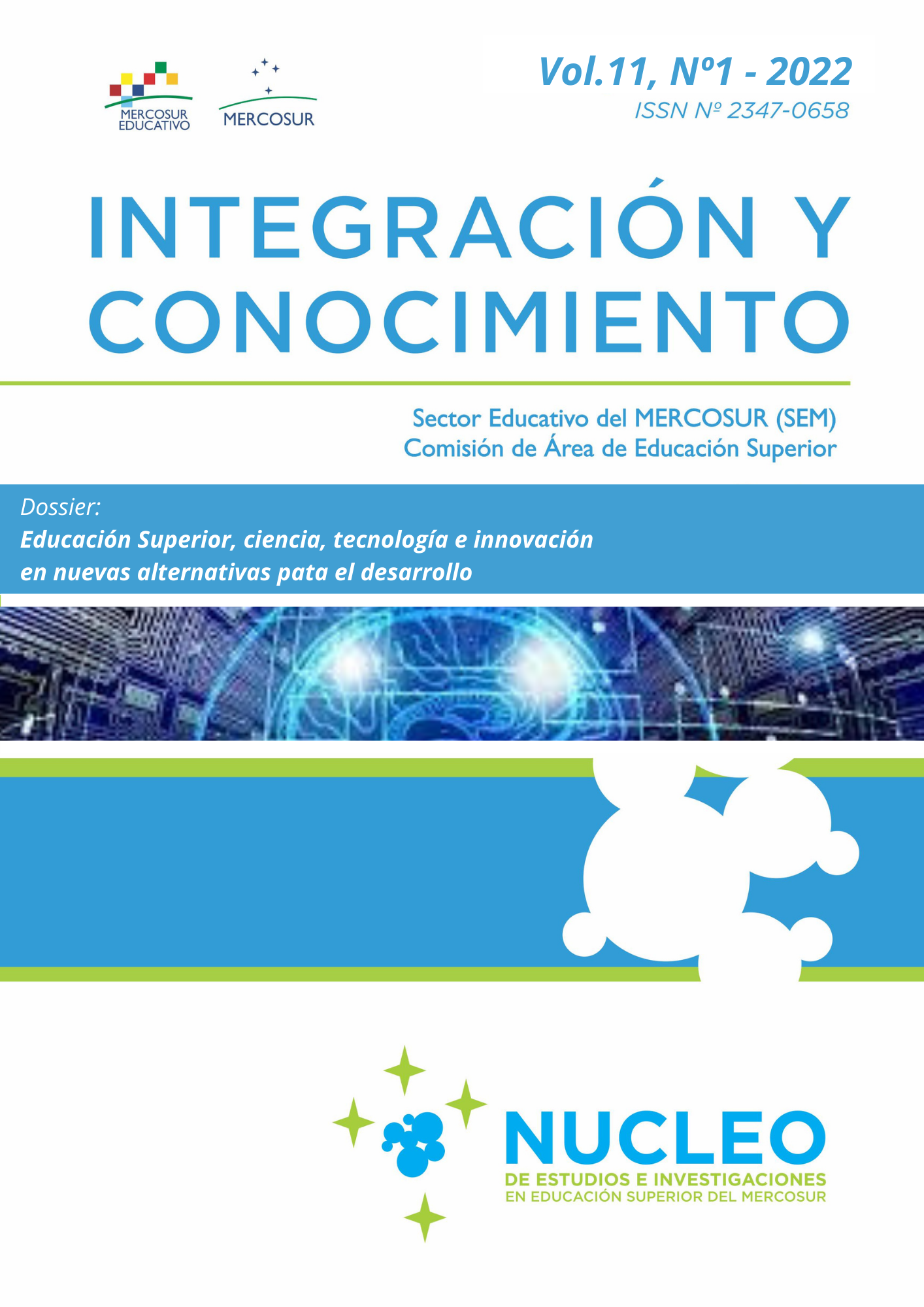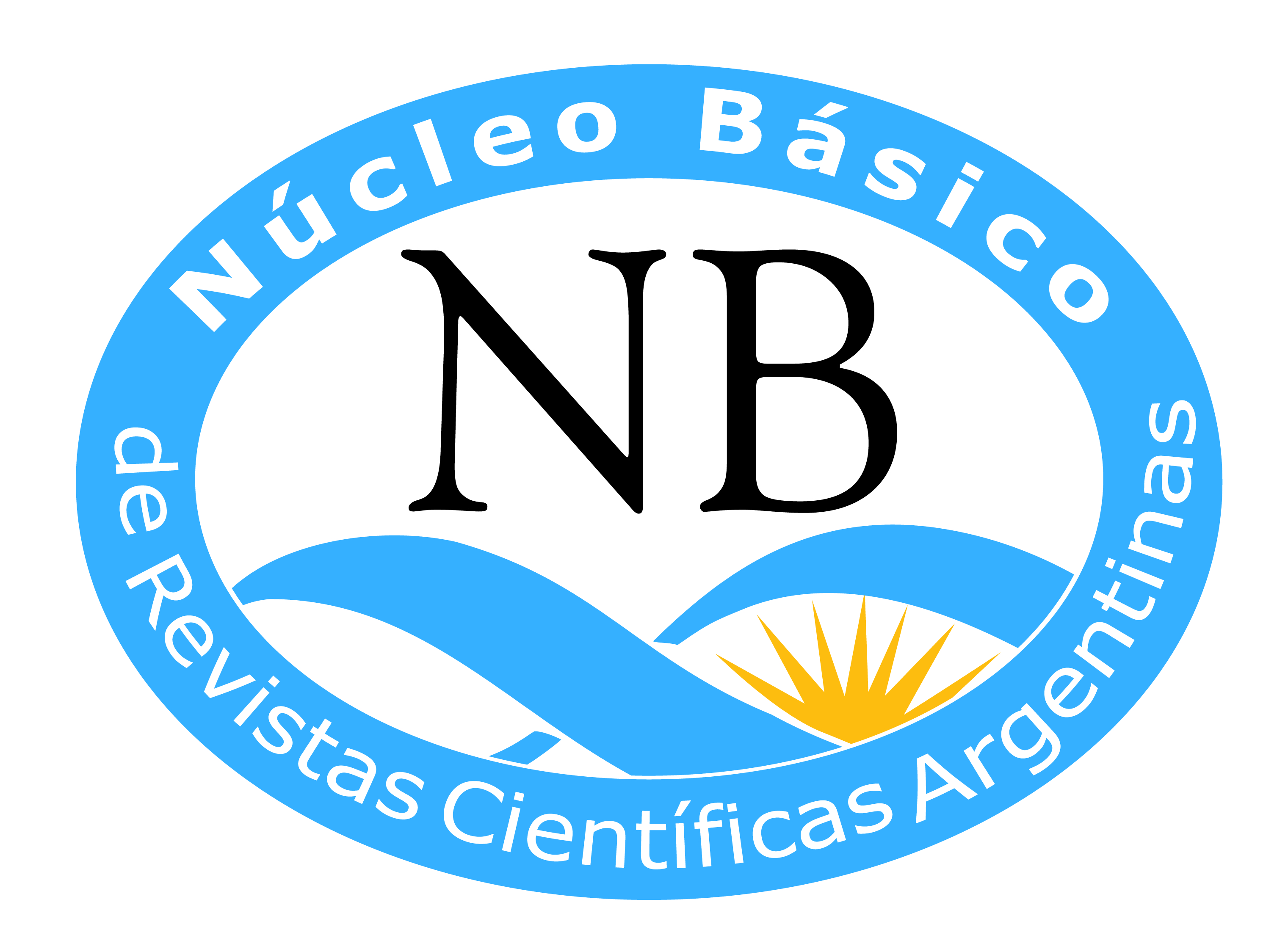Internacionalização do currículo nas universidades argentinas
DOI:
https://doi.org/10.61203/2347-0658.v11.n1.36536Palavras-chave:
internacionalização do currículo, estudos de caso, disciplinasResumo
Internationalisation is a process that has been going through universities on a global scale for the last forty years. Particularly the most traditional modality, embodied in the actions of academic mobility, is the one that has concentrated the greatest weight of institutional efforts and research to date. In this century, new modalities are gaining relevance, which find their most concrete expression in the internationalisation of the curriculum. This research proposes five dimensions of analysis that make the process of internationalisation of the curriculum in Argentinean universities observable: the institutional context, comparable and compatible curricula, the use of a credit system, joint degrees and double degrees, and teaching in a language other than the native one. Two cases (Universidad Nacional de San Martín and Universidad Nacional de Cuyo) are used to analyse how this internationalisation process develops and the particularities it assumes. One of the central aspects was associated with the tension between the individual, disciplinary and institutional levels, which are analysed in each particular case and play an important role in the comparison, allowing conclusions to be drawn about Argentinean public universities and the way in which the process of internationalisation is developed in the higher education system.
Downloads
Referências
Becher, T. (1993). Las disciplinas y la identidad de los académicos. Revista Pensamiento Universitario, 1(1), 56-77.
Beelen, J., & Leask, B. (2011). Internationalization at home on the move. Berlin: Dr. Josef Raabe Verlag.
Beneitone, P. (2019). Internacionalización del currículo: estudio de casos en universidades argentinas. [Tesis de Doctorado]. Buenos Aires: FLACSO. Sede Académica Argentina.
Bonache, J. (1999). El estudio de casos como estrategia de construcción teórica: características, críticas y defensas. Cuadernos de Economía y Dirección de la Empresa, 3(1), 123-140.
Cancino, R., Dam, L., & Jaeger, K. (2011). Policies, Principles, Practices: New Directions in Foreign Language Education in the Era of Educational Globalization. Cambridge: Cambridge Scholars Publishing.
Carson, T. (2009). Internationalizing Curriculum: Globalization and the Worldliness of Curriculum Studies. Curriculum Inquiry, 39(1), 145-148.
Caruana, V., & Hanstock, J. (2008). Internationalising the curriculum at the University of Salford: From rhetoric to reality. En C. Cashel, & A. McKenzie. (Eds.), The global university: The role of senior managers (pp. 31-35). London: DEA.
Childress, L. (2010). The Twenty-first Century University: Developing Faculty Engagement in Internationalization. New York: Peter Lang.
Clark, B. (1991). El sistema de educación superior. Una visión comparativa de la organización académica. México: Nueva Imagen. Universidad. Autónoma Metropolitana–Azapotzalco.
Clifford, V. (2009). Engaging the disciplines in internationalising the currículo. International Journal for Academic Development, 14(2), 133–143.
Clifford, V., Henderson, J., & Montgomery, C. (2013). Internationalising the curriculum for all students: The role of staff dialogue. En J. Ryan. (Ed.), Cross-cultural teaching and learning for home and international students: Internationalisation of pedagogy and curriculum in higher education (pp. 251-264). London: Routledge.
de Wit, H. & Altbach, P. (2020). Internationalization in higher education: global trends and recommendations for its future. Policy Reviews in Higher Education, 5(1), 28-46
de Wit, H., & Beelen, J. (2014). Reading between the lines: Global internationalization survey. University World News.
Didou Aupetit, S. (2014). Cograduaciones y dobles grados internacionales en América Latina: una oferta en mutación. En S. Didou, & M. Fazio. (Coords.), Titulaciones dobles y carreras compartidas en América Latina: Un estado del arte exploratorio en Argentina, Colombia y Ecuador (pp. 21-60). Caracas, Venezuela: IESALC-UNESCO.
Egron-Polak, E., & Hudson, R. (2014). Internationalization of higher education: Growing expectations, essential values. Paris: IAU.
Eisenhardt, K. M. (1989). Building Theories from Case Study Research.
Academy of Management Review, 14(4), 532-550.
Gacel-Ávila, J., (2003). La internacionalización de la educación superior: paradigma para la ciudadanía global. México: Universidad de Guadalajara.
Gacel-Ávila, J. (2006). La dimensión internacional de las universidades. Contexto. Procesos. Estrategias. México: Universidad de Guadalajara.
Gacel-Ávila, J. (2018). Educación superior, internacionalización e integración en América Latina y el Caribe. Caracas: UNESCO – IESALC y Córdoba: Universidad Nacional de Córdoba.
Green, M. F., & Shoenberg, R. (2006). Where faculty live: Internationalizing the disciplines. Washington, DC: American Council of Education.
Green, W., & Whitsed, C. (2015). Introducing Critical Perspectives on Internationalising the Curriculum. In W. Green & C. Whitsed. (Eds.), Critical Perspectives on Internationalising the Curriculum in Disciplines (3-22). Rotterdam: Sense Publishers.
Halonen, M., Ihalainen, P., & Saarinen, T. (2014). Language Policies in Finland and Sweden. Interdisciplinary and Multi-sited Comparisons. Bristol: Multilingual Matters.
Hillebrand, B., Kok, R., & Biemans, W. (2001). Theory-testing using case studies: a comment on Johnston, Leach and Liu. Industrial Marketing Management, 30(8), 651-657.
Hudzik, J. (2011). Comprehensive internationalization: From concept to action. Washington: NAFSA Association of International Educators.
Hyland, F., Trahar, S., Anderson, J. A., & Dickens, A. (2008). A changing world: the internationalisation experiences of staff and students (home & international) in UK Higher Education [Ponencia]. 'The internationalising of UK Higher Education learning and teaching: reflections on policy, practice and theory. Edinburgh, Escocia. http://escalate.ac.uk/downloads/5248.pdf
Karseth, B., & Sivesind, K. (2010). Conceptualising Curriculum Knowledge Within and Beyond the National Context. European Journal of Education, 45(1), 103-120.
Klein, J. T. (1993). Blurring, cracking, and crossing: Permeation and the fracturing of discipline. En E. Messer-Davidow, D. Sylvan, & D. Shumway. (Eds.), Knowledges: Historical and critical studies of disciplinarity (pp. 185-211). Charlottesville, VA: University Press of Virginia.
Leask, B., & Bridge, C. (2013). Comparing internationalisation of the curriculum in action across disciplines: Theoretical and practical perspectives. Compare: A Journal of Comparative and International Education, 43(1), 79–101.
Leask, B. (2015). Internationalising the curriculum. Oxford, UK: Routledge.
Luxon, T., & Peelo, M. (2009). Internationalisation: its implications for curriculum design and course development in UK higher education. Innovations in Education and Teaching International, 46(1), 51–60.
Marsh, D., & Laitinen, L. (2004). Medium of instruction in European higher education: Summary of research outcomes of European Network for Language Learning amongst Undergraduates (ENLU) Task Force 4. Jyväskylä: UniCOM, University of Jyväskylä.
Maxwell, J.A. (1998). Designing a Qualitative Study. En L. Bickman, & D. J. Rog. (Eds.), Handbook of Applied Social Research Methods (pp. 69-100). Thousand Oaks: Sage Publications.
McCutcheon, D., & M., Meredith, J. R. (1993). Conducting case study research in operations management. Journal of Operations Management, 11(1), 239-256.
Nilsson, B. (2000). Internationalising the curriculum. Internationalisation at home: A position paper, 21-27.
Rusciano, F. (2014). Globalizing the Curriculum. How to Incorporate a Global Perspective into Your Courses, Liberal Education, 100(3), 14-21.
Secretaría de Políticas Universitarias. (2015). Anuario 2015. Estadísticas Universitarias Argentinas. Buenos Aires: Ministerio de Educación.
Shohamy, E.G. (2006). Language Policy: Hidden Agendas and New Approaches. Oxford: Routledge.
Stake R. E. (1994). Case Studies. En N. K. Denzin & Y. S. Lincoln. (Eds.) Handbook of Qualitative Research (pp. 236-247). Thousand Oaks, CA: Sage Publications.
Stütz, A. Green, W., McAllister, L. & Eley, D. (2015). Preparing Medical Graduates for an Interconnected World: Current Practices and Future Possibilities for Internationalizing the Medical Curriculum in Different Contexts. Journal of Studies in International Education, 19(1), 28-45.
Turner, Y., & Robson, S. (2007). Competitive and cooperative impulses to internationalization: Reflecting on the interplay between management intentions and the experience of academics in a British university. Education, Knowledge & Economy: A Journal for Education and Social Enterprise, 1 (1), 65–82.
UNESCO-UIS. (2021). Tertiary Education Statistics. Montreal, Canadá.
Van der Walt, C. (2013). Multilingual Higher Education: Beyond English-medium Orientations. Bristol: Multilingual Matters.
Yin, R. K. (2018). Case Study Research and Applications: Design and Methods. Thousand Oaks, CA: Sage Publications.
Downloads
Publicado
Edição
Seção
Licença

Este trabalho está licenciado sob uma licença Creative Commons Attribution-NonCommercial-ShareAlike 4.0 International License.
Os autores que publicaram com esta revista aceitam os seguintes termos:
a. Os autores devem manter seus direitos autorais e garantir à revista o direito de primeira publicação de seu trabalho, que estará simultaneamente sujeito à Licença Creative Commons de Reconhecimento que permite que terceiros compartilhem o trabalho, desde que seu autor seja indicado e sua primeira publicação seja esta revista.
b. Os autores podem adotar outros acordos de licenciamento não exclusivos para a distribuição da versão publicada da obra (por exemplo, depositando-a em arquivo telemático institucional ou publicando-a em volume monográfico), desde que seja indicada a publicação inicial nesta revista.
c. Os autores são autorizados e incentivados a divulgar os seus trabalhos através da Internet (por exemplo, em arquivos telemáticos institucionais ou no seu sítio Web) após a publicação do artigo, o que pode levar a intercâmbios interessantes e a citações acrescidas dos trabalhos publicados. (Ver O Efeito do Acesso Aberto).



